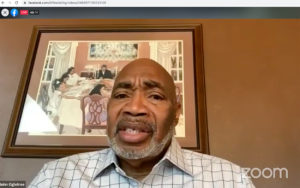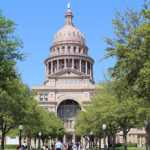Exams for students may be several weeks away, but the time of testing for schools began much earlier, according to Houston pastor who serves on his local school board.
“In Houston, we’ve been through hurricanes, but this coronavirus is something completely different. We thought Harvey was our big test. But COVID-19 is a test like none other,” said John Ogletree, outgoing president of the Cypress-Fairbanks Independent School District board of trustees and senior pastor of First Metropolitan Baptist Church.
Ogletree, who also is president of Pastors for Texas Children, participated with Carol Burris, executive director of the Network for Public Education, in an Aug. 11 virtual panel discussion on “Restarting School During a Pandemic,” sponsored by Good Faith Media. Cameron Vickrey, associate director of Pastors for Texas Children, moderated the discussion.
“There is no one-size-fits-all” answer to the question of when to resume school and how it should be done, Ogletree said.
‘A complicated question’
Burris agreed that decisions about when schools return to in-person, in-classroom instruction defy easy answers and depend largely upon the prevalence of COVID-19 in a particular community or area.
“Of course, teachers are essential workers. The question really is: Do they do their work in person with children, which I think everyone understands is the very best possible scenario, or do they—at least for a while—do their work virtually online? It’s a very complicated question,” she said.
“We don’t want to be irresponsible. At the same time, I believe where schools can open, they should,” she said, adding those schools that open soon can become models to help other districts learn what does and does not work.
Virtual instruction cannot take the place of public school classrooms that offer instruction to children from varied backgrounds and income levels who interact with each other, she added.
Schools in areas that have extremely low rates of infection “have a moral obligation to begin to provide in-person instruction,” she said. However, she said, it would be “foolhardy” to begin classroom instruction in areas with high rates of COVID-19.
Sign up for our weekly edition and get all our headlines in your inbox on Thursdays
“We know that the kids who are hurt the most by virtual instruction are our youngest students,” Burris said, pointing to data that shows prolonged screen time actually can damage brain development in young children.
Since the youngest students also appear to be least at risk of COVID-19, she recommended opening kindergarten and elementary schools first, while limiting class size to allow for social distancing.
Districts face multiple challenges
In addition to considering COVID-19 infection rates, districts also must consider the challenges of putting safety protocols in place and providing necessary resources to allow sanitizing and social distancing, Ogletree said.

Cypress-Fairbanks ISD approved $44 million in technology enhancement to provide every student a laptop computer, he added. The district sent a survey to parents giving them the option of having their children enrolled either in classroom or virtual instruction. To date, 34 percent selected in-person classroom instruction, and 43 percent chose the virtual learning model.
“We’re still trying to get responses back from the others,” he said.
Teachers in the district will go through three weeks of staff development to prepare for the unusual learning environment, and students are scheduled to begin school on Sept. 8.
Ogletree noted the challenges virtual learning presents for non-Anglo students in low-income areas where internet access may be in short supply and parental supervision of lessons may be difficult for parents working multiple jobs.
Ask, ‘How can we help you?’
He particularly decried the politicization of the pandemic.
“We’re in a national pandemic. It is tragic that wearing a mask is political, and putting business over science, which is a false dichotomy,” he said. “Both have to be considered. There will be no business if this pandemic, if the spread of this virus, continues like it is.”
Even during the pandemic, churches can adopt local schools and encourage their teachers and administrators, Ogletree said. When students return to school on Sept. 8, First Metropolitan Baptist Church will send a gift to every teacher in the school the congregation has adopted, along with a message of hope, he noted.
“When you develop a relationship with a school, ask them, ‘How can we help you?’ Be there for them,” he said.
Speaking particularly to pastors and other faith leaders, Ogletree urged: “Now is the season to engage our public schools, our parents and our teachers. Right now, they need a touch—a touch that only you can give to calm their fears. … We can get through this pandemic, but it’s going to take all of us working together, and there is something you can do in the school that’s close to you.”
Additional panel discussions on public education are scheduled at 1 p.m. on Aug. 18 and Aug. 25 at the Good Faith Media Facebook site here.















We seek to connect God’s story and God’s people around the world. To learn more about God’s story, click here.
Send comments and feedback to Eric Black, our editor. For comments to be published, please specify “letter to the editor.” Maximum length for publication is 300 words.